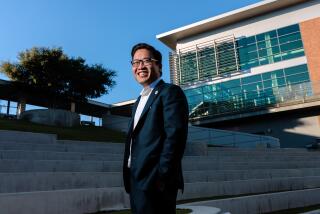Ultimate Fighting Championship’s Lyoto Machida gets in touch with his killer instinct
A championship belt changes everything.
Lyoto Machida was once viewed as a skilled but boring mixed martial arts fighter from Brazil. In becoming the new king of the Ultimate Fighting Championship’s light-heavyweight division -- its most talented division -- with several impressive knockouts on his record, Machida’s mystique is being saluted by UFC executives as something resembling a revival of Bruce Lee.
“He’s interesting, calm, powerful,” UFC owner Lorenzo Fertitta said of Machida. “And mysterious.”
Tonight, Machida will make his first title defense against fellow Brazilian Mauricio “Shogun” Rua in the main event on the UFC 104 card at Staples Center.
The 6-foot-1, 202 1/2 -pound Machida, who wears a karate suit into the octagon, hasn’t lost a fight (15-0) -- and he hasn’t lost a round-- and clearly has performed as someone who knows something his opponents don’t.
Maybe it’s the peace of mind Machida achieves while training at his family’s farm in Brazil -- no cellphones, no traffic. It could be because he’s the son of a Japanese karate master who moved to Brazil to improve his skills and began teaching his child the basics at age 3. Perhaps it’s Machida’s observations of fighting in nature, taking the time to watch a wild big cat or a poisonous serpent stalk and kill its prey near a river offshoot of the mighty Amazon.
“There are many techniques I’m aware of; I’m waiting for the right place for them to be used,” Machida said last week as he concluded training for his Rua fight. “There are many secrets, so the people I fight won’t expect them. When it happens, you’ll notice.”
The last time he fought in Southern California, in September 2007, Machida was not so mildly urged by his boss, UFC President Dana White, to produce more compelling action than the dull but tactical unanimous-decision victory he gained over a Japanese fighter that night in Anaheim.
“I told him he needed to find a killer instinct,” White said. “It’s happened with our other best guys -- Chuck Liddell, Randy Couture and Matt Hughes -- that it took them awhile to feel like this is their home. Once they did, they became finishers. Lyoto’s done that too.”
Machida, 31, has responded with four more victories. He beat former light-heavyweight champ Tito Ortiz in a May 2008 decision, then showcased his superb counter-punching ability, and won UFC knockout of the night bonuses, by knocking out rising star Thiago Silva in the first round of a January bout. Machida then ended Rashad Evans’ short tenure as an unbeaten champion with a brilliant second-round KO in May.
“I needed to get better,” Machida said, when reminded of White’s comments. “I listened to the critics and the fans who were saying I needed to put on more exciting fights. I’ve changed my game plan and changed what I was doing.”
Machida said he became a more devout student by breaking down future opponents on film, finding their weaknesses and being more demanding in his selection of local Brazilian sparring partners who better suited his next opponent. He also hired a new weightlifting and conditioning trainer to increase his strength. His confidence in delivering the devastating blows to Silva and Evans were the net result.
Machida has long trained year-round near the Amazon, not only pushing himself through exhausting workouts but becoming “in sync with nature, which helps me become a more focused fighter. . . . I sleep better, I meditate more, I swim in the river . . . so when I step into the octagon, I’m more relaxed and prepared,” he said.
His beaten foes and mixed martial arts enthusiasts often describe Machida as “unorthodox,” and the new champion does rely on alternative study habits.
He observes animal movements, like that of the elusive wild Bengal tiger known as a maracaja, and has tinkered with karate moves directed by his father and trainer, Yoshizo, referring to his brand of the discipline as “Machida Karate.” White said he’s been amazed by Machida’s ability to “throw combinations with his feet like they’re his hands -- who . . . can do that?”
Machida said: “I kick from different angles, and have a locker room full of weapons people don’t expect. . . . I don’t necessarily think I have the best technique, but maybe I adapt better.”
The depth of the light-heavyweight division has caused the championship belt to be passed in two years from Liddell to Rampage Jackson to Forrest Griffin to Evans and now to Machida.
“My first goal was to win the title,” Machida said. “My second is to hang onto it.”
--
More to Read
Go beyond the scoreboard
Get the latest on L.A.'s teams in the daily Sports Report newsletter.
You may occasionally receive promotional content from the Los Angeles Times.











